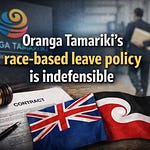A male netball player born in Hamilton, New Zealand, has been banned from women’s competition in Victoria, Australia - a decision that has sparked debate but ultimately upholds the integrity and fairness of women’s sport.
Manawa Aranui, a biological male, was playing for Melton Central Netball Club when he was involved in an on-court incident that saw a female opponent knocked to the ground. While the incident itself wasn’t deemed a foul, footage shows Aranui – who previously played elite-level men’s netball – overpowering a female competitor during regular play.
Following growing concern and complaints from opposing teams, the Riddell District Football Netball League made the decision to ban both Aranui and a teammate for the remainder of the 2025 season. Some clubs had even threatened to boycott matches if action wasn’t taken, citing concerns over player safety and fairness.
In their ruling, the league highlighted the players’ “superior stamina and physique,” noting these advantages posed a clear risk in a female league. The decision was supported by Section 42 of Australia’s Sex Discrimination Act, which allows sports bodies to restrict participation where physical attributes are materially relevant – an essential safeguard for women’s sport.
This case illustrates a growing issue facing women’s sport internationally: the pressure to accommodate biological males in female competitions, even when their physical advantages remain.
World Netball’s policy reflects similar concerns, stating that international women’s competitions are limited to those recorded female at birth or transgender athletes who can prove they’ve never experienced the biological effects of testosterone – a near-impossible standard for those who’ve gone through male puberty.
Netball Victoria has launched its own review of the matter and is consulting with an independent expert, though it currently allows transgender and non-binary athletes to play in female grades – a policy many now see as needing urgent review.
Despite the ban, Aranui has spoken out, calling the decision an attack on his character and accusing one of the clubs, Melton South Football Netball Club, of hypocrisy. In a social media post, he claimed their head coach had once attempted to recruit him, sharing screenshots of a private conversation. But a past recruitment offer does not override the concerns of fairness and safety raised by multiple clubs and players.
Aranui also noted that he played a full season last year without incident. However, this only reinforces the difficulty female players face in speaking up – until one moment of visible dominance finally forces action.
Women’s sport exists to provide fair and safe competition for biological females – something that cannot be guaranteed when male bodies are allowed on court. Strength, height, speed, and muscle mass cannot be ignored. This isn’t about identity; it’s about biological reality.
The decision to ban Aranui wasn’t an act of “bigotry” – it was a responsible and necessary move to protect the integrity of the women’s game. If sporting bodies are serious about upholding equality, they must ensure that women are not asked to compete against athletes with undeniable physical advantages.
Anything less is not inclusion – it’s erasure.











